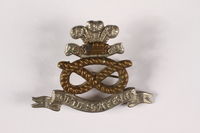Overview
- Description
- The collection documents the Holocaust experiences of the Levy family of Saarlouis (present day Saarlouis, Germany). Included are identification papers; birth, marriage, and death certificates; immigration and travel documents; and family books that document the movements and lives of Alfred, his wife Meta (née Mayer), and their children Marlyse and Theo as they encountered increasing Nazi persecution in the pre-war and wartime years in the French cities of Saarlouis, Saarbrücken, Thionville, Villefranche-de-Rouergue, as well as Luxembourg. Also included are photographs depicting Alfred Levy as a soldier in World War I and a Supreme Court justice in Saarlouis and Saarbrücken; the Levy family in Luxembourg and Villefranche-de-Rouergue; the Mayer family; the inauguration of a new synagogue in Saarbrücken; and the World Jewish Congress meeting in Montreux, Switzerland.
- Date
-
inclusive:
1887-1981
bulk: 1924-1969
- Credit Line
- United States Holocaust Memorial Museum Collection, Gift of Marlyse Levy Kennedy
- Collection Creator
- Levy family
- Biography
-
Alfred Levy (1888-1962) was born on 15 November 1888 in the Fraulautern neighborhood of Saarlouis (present day Saarlouis, Germany) to Daniel and Joséphine (née Schmitt) Levy. He had one sister, Julie. Alfred was a veteran of World War I, and studied law afterwards.
Meta Mayer Levy (born Meta Eve Mayer, 1891-1969) was born on 1 January 1891 in Saarlouis to Eduard (b. 1857) and Auguste (née Herz) Mayer. She had two sisters, Ella (1888-1918) and Olga (later Olga Scherman,b. 1893-1980). Ella died in 1918 of the Spanish Flu. Olga married Richard Scherman (1897-1987). They had a son named Rolf (b. 1928) and immigrated to the United States.
Alfred and Meta married in 1924 in Saarlouis. Their daughter Marlyse (born Mary Louise Levy; later Marlyse Kennedy) was born in 1925, and their son Theo (1932-1998) was born in 1932.
The family lived in Saarlouis where Alfred was a judge and Meta worked with her family’s shoe store business. After the citizens voted in 1935 for independent Saarland to rejoin Germany, the Levys decided to immigrate to Luxembourg later that year to flee the growing Nazi presence. That same year, Marlyse began attending school in Thionville, France. After Luxembourg was occupied by Germany in May 1940, the Levys were deported to Vichy France in December 1940. They lived in Villefranche-de-Rouergue, surviving with financial assistance from relatives since Alfred was not able to find work. In 1943, the family was warned by the Resistance that Alfred was to be arrested. He went into hiding on a farm, but was later arrested trying to visit the family. He was soon released with assistance from the Resistance. The family went into hiding again, with Alfred on the farm, Meta and Marlyse at a nursing home run by nuns, and Theo with his math teacher. The area was liberated in fall 1944, and the family moved to Saarbrücken by 1946. Alfred became a judge again, and was active in assisting Jews seeking restitution. Marlyse immigrated to the United States via the SS Liberte in 1952. She married John Kennedy and had a career as an anesthesiologist. Her brother Theo remained in Saarbrücken.
Marlyse’s cousin, Marcel Siesel, was in the Resistance and was murdered by the Nazis.
Physical Details
- Genre/Form
- Photographs.
- Extent
-
2 boxes
2 oversize boxes
3 oversize folders
- System of Arrangement
- The collection is arranged as two series: Series 1: Biographical materials, 1887-1981 and undated; Series 2: Photographs, circa 1895-circa 1960 and undated
Rights & Restrictions
- Conditions on Access
- There are no known restrictions on access to this material.
- Conditions on Use
- Material(s) in this collection may be protected by copyright and/or related rights. You do not require further permission from the Museum to use this material. The user is solely responsible for making a determination as to if and how the material may be used.
Keywords & Subjects
Administrative Notes
- Holder of Originals
-
United States Holocaust Memorial Museum
- Legal Status
- Permanent Collection
- Provenance
- The collection was donated to the United States Holocaust Memorial Museum by Marlyse Kennedy in 2015. An accretion was donated in 2016.
- Record last modified:
- 2023-02-24 14:26:07
- This page:
- https://collections.ushmm.org/search/catalog/irn531110
Additional Resources
Download & Licensing
In-Person Research
- Available for Research
- Plan a Research Visit
-
Request in Shapell Center Reading Room
Bowie, MD
Contact Us
Also in Alfred and Meta Mayer Levy family collection
The collections consists of medals, documents, and photographs relating to the experiences Alfred Levy and Meta Mayer Levy and their children Marie-Louis and Theo Levy, and their extended family before the Holocaust in Germany. [Accretion: pair of silver candlesticks given to Alfred Levy by the Jewish Community of Saarbrucken after the war as a gift for his tenure as president; Shabbat lamp; Framed family portrait of Siesel family, Framed portrait of Alfred Levy; Framed drawing of Simon Levy; Film reel (to go to Film & Video); photo album of Marcel, a member of the resistance who was executed by Nazis; modern day publications of resistance, DVDs and videos ((to go to Library)]
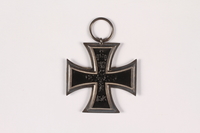
World War I Iron Cross medal awarded to a Jewish German veteran
Object
World War I Iron Cross medal awarded to Alfred Levy for his service in the German Army during the First World War (1914-1918). The medal was issued to him in Nazi Germany in 1936. Alfred, a judge, his wife Marie, and their children Marie-Louise and Theo moved from the Saar region when it voted to reunify with Germany in 1935. They resettled in Luxembourg which was occupied by Germany in May 1940. Restrictions were placed on the Jewish population to segregate them from other citizens and Marie-Louise, 15, had to leave school. In December 1940, the family was deported to Vichy France, and escaped the internment camps to live in Villefranche-de-Rouergue. In November 1942, after Germany occupied Vichy, a neighbor informed upon the Levy family. In 1943, Alfred was notified by the French resistance that he was in danger of arrest. He went into hiding, and was arrested while visiting his family, and then released with the help of a French police office. The entire family went into hiding until the region was liberated in fall 1944. In 1946, they returned to Saar.
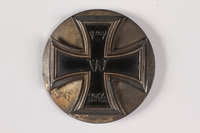
World War I medal awarded to a Jewish German veteran
Object
World War I medal awarded to Alfred Levy for his service in the German Army during the First World War (1914-1918). Alfred, a judge, his wife Marie, and their children Marie-Louise and Theo moved from the Saar region when it voted to reunify with Germany in 1935. They resettled in Luxembourg which was occupied by Germany in May 1940. Restrictions were placed on the Jewish population to segregate them from other citizens and Marie-Louise, 15, had to leave school. In December 1940, the family was deported to Vichy France, and escaped the internment camps to live in Villefranche-de-Rouergue. In November 1942, after Germany occupied Vichy, a neighbor informed upon the Levy family. In 1943, Alfred was notified by the French resistance that he was in danger of arrest. He went into hiding, and was arrested while visiting his family, and then released with the help of a French police office. The entire family went into hiding until the region was liberated in fall 1944. In 1946, they returned to Saar.
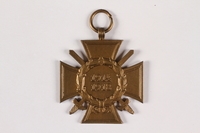
World War I medal awarded to a Jewish German veteran
Object
World War I medal awarded to Alfred Levy for his service in the German Army during the First World War (1914-1918). Alfred, a judge, his wife Marie, and their children Marie-Louise and Theo moved from the Saar region when it voted to reunify with Germany in 1935. They resettled in Luxembourg which was occupied by Germany in May 1940. Restrictions were placed on the Jewish population to segregate them from other citizens and Marie-Louise, 15, had to leave school. In December 1940, the family was deported to Vichy France, and escaped the internment camps to live in Villefranche-de-Rouergue. In November 1942, after Germany occupied Vichy, a neighbor informed upon the Levy family. In 1943, Alfred was notified by the French resistance that he was in danger of arrest. He went into hiding, and was arrested while visiting his family, and then released with the help of a French police office. The entire family went into hiding until the region was liberated in fall 1944. In 1946, they returned to Saar.
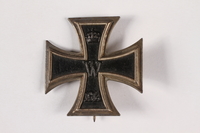
World War I medal awarded to a Jewish German veteran
Object
World War I medal awarded to Alfred Levy for his service in the German Army during the First World War (1914-1918). Alfred, a judge, his wife Marie, and their children Marie-Louise and Theo moved from the Saar region when it voted to reunify with Germany in 1935. They resettled in Luxembourg which was occupied by Germany in May 1940. Restrictions were placed on the Jewish population to segregate them from other citizens and Marie-Louise, 15, had to leave school. In December 1940, the family was deported to Vichy France, and escaped the internment camps to live in Villefranche-de-Rouergue. In November 1942, after Germany occupied Vichy, a neighbor informed upon the Levy family. In 1943, Alfred was notified by the French resistance that he was in danger of arrest. He went into hiding, and was arrested while visiting his family, and then released with the help of a French police office. The entire family went into hiding until the region was liberated in fall 1944. In 1946, they returned to Saar.
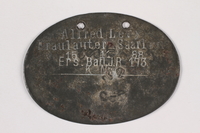
World War I dog tags worn by a Jewish soldier
Object
World War I dog tags issued to Alfred Levy for his service in the German Army during the First World War (1914-1918). Alfred, a judge, his wife Marie, and their children Marie-Louise and Theo moved from the Saar region when it voted to reunify with Germany in 1935. They resettled in Luxembourg which was occupied by Germany in May 1940. Restrictions were placed on the Jewish population to segregate them from other citizens and Marie-Louise, 15, had to leave school. In December 1940, the family was deported to Vichy France, and escaped the internment camps to live in Villefranche-de-Rouergue. In November 1942, after Germany occupied Vichy, a neighbor informed upon the Levy family. In 1943, Alfred was notified by the French resistance that he was in danger of arrest. He went into hiding, and was arrested while visiting his family, and then released with the help of a French police office. The entire family went into hiding until the region was liberated in fall 1944. In 1946, they returned to Saar.
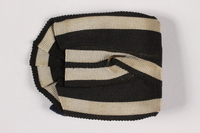
World War I blue and white ribbon awarded to a Jewish German veteran
Object
World War I ribbon awarded to Alfred Levy for his service in the German Army during the First World War (1914-1918). Alfred, a judge, his wife Marie, and their children Marie-Louise and Theo moved from the Saar region when it voted to reunify with Germany in 1935. They resettled in Luxembourg which was occupied by Germany in May 1940. Restrictions were placed on the Jewish population to segregate them from other citizens and Marie-Louise, 15, had to leave school. In December 1940, the family was deported to Vichy France, and escaped the internment camps to live in Villefranche-de-Rouergue. In November 1942, after Germany occupied Vichy, a neighbor informed upon the Levy family. In 1943, Alfred was notified by the French resistance that he was in danger of arrest. He went into hiding, and was arrested while visiting his family, and then released with the help of a French police office. The entire family went into hiding until the region was liberated in fall 1944. In 1946, they returned to Saar.
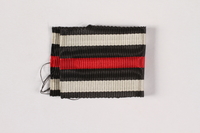
Piece of black, white and red striped ribbon awarded to a Jewish German veteran
Object
World War I medal awarded to Alfred Levy for his service in the German Army during the First World War (1914-1918). Alfred, a judge, his wife Marie, and their children Marie-Louise and Theo moved from the Saar region when it voted to reunify with Germany in 1935. They resettled in Luxembourg which was occupied by Germany in May 1940. Restrictions were placed on the Jewish population to segregate them from other citizens and Marie-Louise, 15, had to leave school. In December 1940, the family was deported to Vichy France, and escaped the internment camps to live in Villefranche-de-Rouergue. In November 1942, after Germany occupied Vichy, a neighbor informed upon the Levy family. In 1943, Alfred was notified by the French resistance that he was in danger of arrest. He went into hiding, and was arrested while visiting his family, and then released with the help of a French police office. The entire family went into hiding until the region was liberated in fall 1944. In 1946, they returned to Saar.
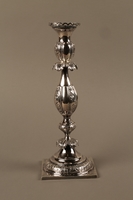
Candlesticks
Object
Pair of silver candlesticks given to Alfred Levy by the Jewish Community of Saarbrucken after the war as a gift for his tenure as president.

Lamp
Object

Drawing
Object
563795
Object

